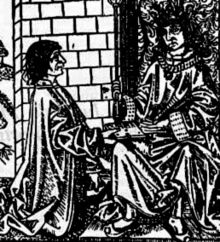Juan de Mena
Juan de Mena (* 1411 in Córdoba , Spain , † 1456 in Torrelaguna , today the city of Madrid , Spain) was a Spanish poet.
Juan de Mena studied at the University of Salamanca , then made himself familiar with ancient classical literature in Rome, and on his return became the Latin secretary and royal chronicler of King John II as well as a member of the council of his native city; he died in 1456.
Mena is considered the father of Spanish poetry and as such is probably called the Spanish Ennius . He took the old people and the Italians as models.
His main work is the didactic poem Laberinto de Fortuna (Labyrinth of Fate), Seville 1496; with commentary by Hernán Núñez, also called Las Trecientas (The Three Hundred) after the number of stanzas , an allegorical painting of the Changes of Happiness and an obvious imitation of Dante's Divine Comedy .
Despite some fine details, the poetic value of the work is on the whole small; but it was greatly admired by contemporaries and repeatedly imitated in Spain and Portugal. Mena's other poetic works include: La Coronaçión (The Coronation, 1492), a poem to celebrate the coronation of the Marquis de Santillana; the allegorical-ascetic poem Coplas de los siete pecados mortales (1500) and several smaller pieces in the courtly style.
literature
- Gericke, Philip O .: "Juan de Mena (1411-1456)" Castilian Writers , 1400-1500. Edited by Frank A. Domínguez and George D. Greenia. Vol. 286. Detroit, MI: Gale, 2004. 109-126.
- Street, Florence: “La vida de Juan de Mena.” Bulletin hispanique 55 (1953): 149-173.
- Mena, Juan de: Obras completas . [Ed. y prólogo de Ángel Gómez Moreno]. Barcelona: Turner, 1994. ISBN 84-7506-407-8
- Crosas López, Francisco: La materia clásica en la poesía de cancionero. Kassel: Ed. Reichenberger, 1995. ISBN 3-930700-23-9 . (Teatro del Siglo de Oro: Estudios de literatura; 30).
Web links
Literature by and about Juan de Mena in the catalog of the German National Library
Remarks
- ↑ See for example Las trezientas […] glosadas por Fernan Nunez. Anvers 1552.
| personal data | |
|---|---|
| SURNAME | Mena, Juan de |
| BRIEF DESCRIPTION | Spanish poet |
| DATE OF BIRTH | 1411 |
| PLACE OF BIRTH | Cordoba , Spain |
| DATE OF DEATH | 1456 |
| Place of death | Torrelaguna , Madrid |
